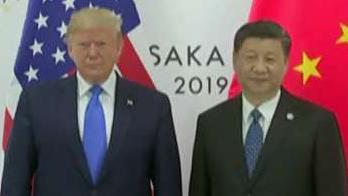Trump's 'brilliant stroke' with China's Xi a win for US, Michael Pillsbury says
President Trump and Chinese President Xi Jinping agreed during this weekend's G20 summit in Japan to restart trade talks.
Michael Pillsbury, who advised Trump and White House trade adviser Peter Navarro ahead of the summit, said the president deserves credit.
“The most important thing was to get President Xi to return his delegation to the talks," the Hudson Institute China strategy director told Maria Bartiromo on “Sunday Mornings Futures.”
"There was a major breakdown 6 weeks ago. The talks really faced extinction at that point. They were taking back a lot of major points they were refusing to go further on the enforcement mechanism. And so that was a pretty bleak situation,” he said. “I think what had to happen is ... President Xi's team made clear ... that he [needed] something on Huawei at this meeting. He also needed to have the tariffs at least not imposed at this meeting. Otherwise he would be saying no to any further talks. That's what President Trump did. It's a brilliant stroke. The president deserves a lot of credit."
President Trump, during the meeting, agreed to hold off on raising tariffs and to relax the Huawei ban, allowing U.S. companies to continue doing business with the Chinese tech giant. In exchange for the concessions, China will buy a “tremendous amount” of American food and agricultural products, Trump said.
“[Trump] hasn’t spelled out the details of the Huawei matter. He hasn't said you know Huawei could be in 5G now around the world. But he has focused on American technology suppliers of parts to Huawei. This gives President Xi the face he needs to face down his hawks in China and restart the talks. So it's a huge success for the president,” Pillsbury said.
CLICK HERE TO GET THE FOX BUSINESS APP
In Pillsbury’s opinion, the concessions are not a risk to U.S. national security because the government is still banned from buying products.
“This goes back to what the president did on the ZTE matter… he hasn't said Huawei should be put out of business. He's talked about the national security threat from Huawei eavesdropping back-doors surveillance, a series of things that are just not acceptable. So he doesn't want Huawei to get into sensitive sectors around the world. Our government is still banned from buying Huawei products. But it's something different to say we want to bankrupt and destroy Huawei -- that's what the president has not done,” he explained.
“I actually had a meeting in London last month with the Huawei leadership. They make a distinction between keeping alive, like ZTE did with 70,000 jobs for China, versus being put out of business entirely. I think that's the needle the president has threaded,” he added.




















